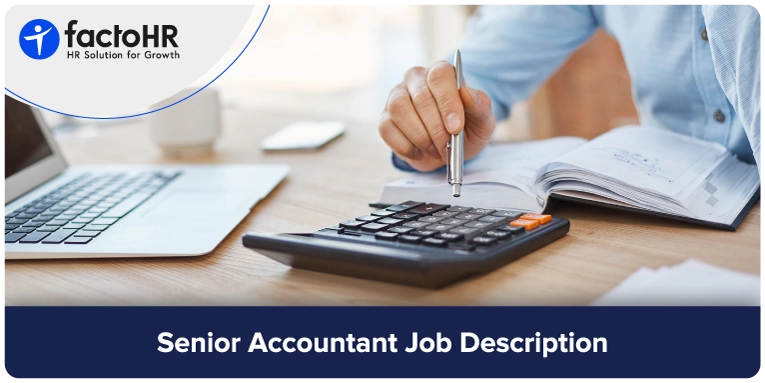Senior Accountant Job Description [Template and Sample]

Free AI Job Description Generator
Create your perfect job description for any role in seconds.
Table of Contents
A senior accountant manages financial records, ensures compliance with accounting principles such as GAAP, and forecasts budget. Key duties of a senior accountant include preparing financial statements, supporting audits, making reports, and improving internal financial processes.
A job description of a senior accountant should list key skills and requirements, roles and responsibilities, and a crisp job summary. Use our optimized, customizable senior accountant job description template to post jobs for various industries including finance, IT, healthcare, and marketing among others.
Senior Accountant Job Description Template
A Senior Accountant job description should recruit qualified candidates by clearly outlining the role’s key responsibilities and expectations. It should focus on an organization’s commitment to financial accuracy, integrity, and growth.
About Us
[Company Name] is a dynamic, growth-focused organization committed to maintaining strong financial discipline and operational efficiency. With a skilled team of over [X] professionals, we ensure accurate financial reporting, transparent accounting practices, and smooth day-to-day company operations. Our collaborative culture, data-driven mindset, and dedication to compliance enable us to support strategic decision-making and deliver long-term value to the business. As part of this commitment, the Senior Accountant plays a key role in managing financial records, optimizing processes, and ensuring the company’s financial health.
Job Title: Senior Accountant
Employment Type: [Full-time/Part-time/Contract]
Location: [Mention city/remote/hybrid option.]
Job Summary
[Write a crisp summary in 2–3 lines describing the purpose of the role and how it adds value to the organization.]
Responsibilities:
- [Responsibility 1]
- [Responsibility 2]
- [Responsibility 3]
Qualifications:
[List the educational background or certifications required. Example: Bachelor’s/Master’s degree in a relevant field.]
Skills and Abilities:
- [Skill 1 – highlight technical or soft skills]
- [Skill 2]
- [Skill 3]
Experience: [Insert years of experience required and type of industry/domain exposure preferred.]
Working Hours: [State standard office hours or flexibility options.]
Salary and Benefits:
- [Competitive salary/mention perks like PF, bonuses, health insurance]
- [Growth opportunities or career development programs]
Application Instructions:
[Guide candidates clearly: “Apply by sending your CV to [email/ATS link] with subject line: Application for [Job Title]”.]
From the above template, you can select the descriptions that best match the job role and requirements of your organization.

Senior Accountant Job Description Sample
Netizens India, founded in 2019 and based in Delhi, is a digital marketing company built around the idea that people shape the strongest brands. Our team of 200 specialists works across social media strategy, content development, paid promotions, influencer partnerships, and community growth. We use practical tools and industry insight to help clients build real connections with their audiences while staying true to each brand’s voice. What sets us apart is the talent and commitment of our people, who bring creativity, problem-solving, and genuine collaboration to every project.
Job Title: Senior Accountant
Employment Type: Full-time
Location: Remote
Job Summary
The Senior Accountant at Netizens India maintains clean financial records for a busy digital marketing setup, handling billing cycles, reconciliations tied to campaigns, and timely statutory work. The role keeps revenue flows steady through accurate invoicing and follow-ups. It also supports leadership with financial clarity that strengthens pricing decisions and overall operational planning.
Responsibilities:
- Maintain and reconcile general ledger entries, accounts payable, accounts receivable, vendor payments, and campaign-related expenditures.
- Manage billing and invoicing for client retainers, campaign milestones, and vendor/vendor-influencer payments.
- Prepare monthly financial statements, cash-flow summaries, and reconciliations to support agency operations.
- Ensure timely compliance with statutory and tax requirements (GST, TDS, payroll-related filings) as applicable for a Delhi-based firm.
- Collaborate with leadership to analyze financial data for campaign cost-effectiveness, budget planning, and pricing decisions.
- Assist in audit preparation, maintain financial records, and coordinate with auditors when required.
- Recommend and implement process improvements to streamline accounting workflow, billing cycles, and financial controls.
Qualifications:
- Bachelor’s degree in Commerce, Accounting, or Finance, along with strong grounding in Indian statutory requirements such as GST and TDS.
- Proven experience managing billing cycles, reconciliations, and month-end tasks in a fast-paced services or agency environment.
- Proficiency in accounting software and Excel, with the ability to streamline workflows and maintain clear, reliable financial records.
Skills and Abilities:
- Ability to review financial entries with precision and maintain clean records.
- Strong grasp of GST and TDS requirements for service-focused companies.
- Skilled in using accounting software and Excel for routine financial tasks.
- Capable of managing billing cycles connected to client work and vendor payments.
- Clear communication when coordinating with internal teams or auditors.
- Comfortable working with firm deadlines in a fast-moving agency setup.
- Consistent in maintaining confidentiality and protecting financial data.
Experience:
- 5+ years of experience in managing finances, accounting or similar role.
Working Hours:
- Monday to Saturday, 9:00 AM to 6:30 PM
Salary and Benefits:
- Competitive salary package
- Opportunities to work with one of the top brand’s in India
- Career progression support with training and development.
Application Instructions:
Apply by sending your CV to hr@netizens.com with the subject line: Application for Senior Accountant.

Frequently Asked Questions
What is a Senior Accountant?
A Senior Accountant is a finance professional who oversees core accounting work, reviews financial records, manages compliance tasks, and supports leadership with reliable financial insights. The role ensures that transactions are recorded correctly and that the company’s books stay accurate throughout the year.
What are the Duties and Responsibilities of a Senior Accountant?
A Senior Accountant handles general ledger maintenance, monthly closing tasks, billing, reconciliations, vendor payments, financial reporting, and statutory requirements such as GST and TDS. The role also guides process improvements and supports audits by keeping documentation clear and well-organised.
Who does a Senior Accountant Work with?
A Senior Accountant works closely with the finance team, auditors, HR for payroll inputs, client servicing teams for billing details, and vendors for payment coordination. The role also interacts with management when preparing reports or planning budgets.
What does a Senior Accountant do?
The accountant’s responsibilities include a combination of routine tasks and problem-solving challenges. They prepare account reconciliations, analyze financial data, and produce various financial reports and statements.
What Role does HR Play in Hiring an Accountant?
HR is responsible for defining the job requirements, crafting the job description, and managing the recruitment process. This includes posting the job, screening candidates, coordinating interviews, and ensuring the selected candidate’s qualifications align with the company’s needs.
Which Soft Skills are Important for Senior Accountants?
For senior accountants, soft skills relating to communication (written and verbal), strong problem-solving and analytical capabilities, attention to detail, working under pressure, time management, and working alone and in a team environment are instrumental.
Also, Get Your Free, Ready-To-Use Job Description Templates Here:
© 2026 Copyright factoHR



